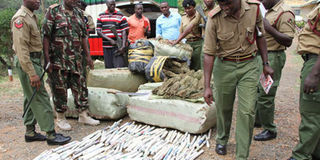Bhang trade thrives despite police dragnets

Administration Police officers in Migori Town inspect bhang seized on the Isebania-Migori-Kisii highway on January 16, 2018. The bhang was being transported to Meru from Tanzania. PHOTO | VIVERE NANDIEMO | NATION MEDIA GROUP
What you need to know:
- In December, the High Court ordered the destruction of bhang that was estimated to be valued at Sh3 million.
- Rongo OCPD Joseph Satia said weak anti-narcotics laws in Tanzania are a hurdle in the war on trafficking.
Bhang trafficking remains one of the most lucrative businesses on the Kenya-Tanzania boundary.
Despite efforts to end the illegal trade, dealers are coming up with ingenious ways of ensuring the drug reaches their customers.
At Isebania border town, business in cannabis is prospering.
This is attributed to the fact that the drug is widely grown in Tanzania.
Authorities say a big percentage of seized cannabis originates from Tanzania and is smuggled into Kenya through the Isebania/Sirare border point.
FARMERS
According to police records, the cannabis impounded in the region in the last three years may be valued at Sh120 million.
Kenyan drug barons have fraudulently acquired huge tracts of land in Tarime district across the border where they grow cannabis alongside maize or sugarcane.
Upon maturity, the bhang is harvested and transported to Isebania where it makes its way into Kenya.
“A lot of it is grown by Kenyans,” Mr Salim Mwanamwali Mwapejo, a Tanzanian in Isebania said.
Mr Mwapejo added that Tanzanian authorities do little to limit the growing of the crop.
“I think it is because bhang is not used much in Tanzania,” he said.
A number of Tanzanian farmers have also ventured into bhang growing.
BHANG DESTROYED
Dealers prefer Toyota Probox cars to transport the drug to their destinations in Kenya.
Even with seizure of large quantities of the drug, business still thrives.
Last month, Administration Police officers in Migori impounded bhang valued at Sh5 million.
County AP chief Julius Mukanda said the haul was from Tanzania and was being taken to Meru County.
In December last year, the High Court ordered the destruction of bhang that was estimated to be valued at Sh3 million, which had been seized on the Isebania-Migori-Kisii road between 2015 and 2017.
Rongo magistrate Raymond Lang’at recently said the court handled more than 300 bhang trafficking cases in two years.
“It signifies the gravity of the menace,” Mr Lang’at said.
LAWS
Rongo OCPD Joseph Satia said weak anti-narcotics laws in Tanzania are a hurdle in the war on trafficking.
“It is a tough war. As much as we have put in efforts to eliminate the trade, Tanzania does not restrict growing of the drug, meaning it is readily available,” he said.
The many vehicles parked at Rongo, Migori and Isebania police stations show the magnitude of the war on cannabis.
Most of the cars were impounded while transporting the drug. The owners have cases in courts or others just abandoned them upon being stopped by police officers.
Dealers have devised ways of evading customs officials and police. Some pack the drug in food wrappers.
TRANSPORT
A lot of cannabis is hidden in trucks carrying maize from Tanzania. According to police, dealers spray the vehicles with perfumes.
Mr Martin Chacha, a Kenya Revenue Authority official in Isebania, said dealers know how to conceal the product during transportation.
“Some of them travel on top of the vehicles, making it hard for police to detect what they are carrying. Others collude with truck drivers and pack the bhang in bags with other items,” he said, adding that traffickers prefer to travel in the wee hours of the morning.
Other dealers have resorted to using discreet routes on the porous boundary using boda bodas.
Such routes include Gwitembe, Masangora, Getambwega, Nyamtiro and Bongebo. Charcoal sellers from Gwitembe are also known to hide bundles of bhang in their sacks.
Police say women are increasingly becoming key figures in the bhang business.
They hide rolls of bhang in their dresses and in the goods they buy from Tanzania.
BRIBERY
In 2015, three women were charged in a Migori court with trafficking bhang. At the time of arrest, they were carrying children.
Residents say some rogue police officers are also involved in the illicit trade, often making a lot of money in bribes. A dealer can part with Sh20,000 at a roadblock.
Sources say officers manning checkpoints are known to agents of some of the most notorious barons and often allow them to pass.
The Nation also learnt that a number of politicians and tycoons, especially in Kuria, use bhang proceeds to advance their causes.
This group carries out the trade unabated because of its financial influence.
They have also invested heavily in other commercial ventures to cover their tracks.
These dealers operate in a wide network across Kenya, involving other traffickers, especially in Nairobi and Mombasa.
However, some locals, including teachers and civil servants, have joined the business because of the allure of quick money.





